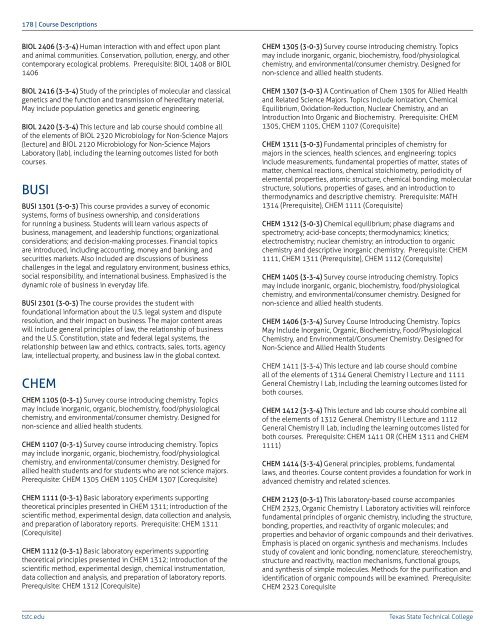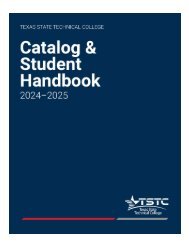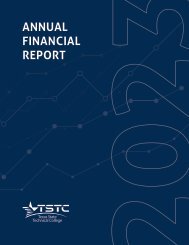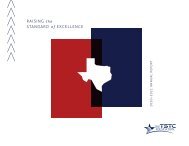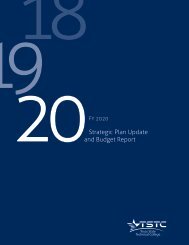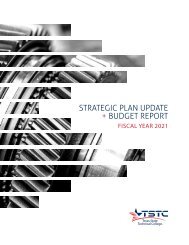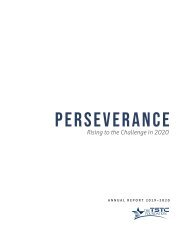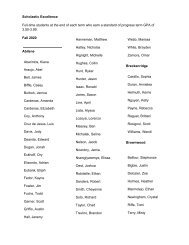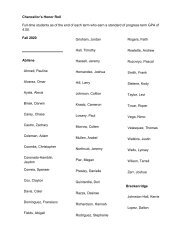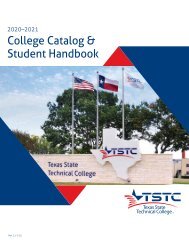Student Handbook and Catalog 2021-22 V2
You also want an ePaper? Increase the reach of your titles
YUMPU automatically turns print PDFs into web optimized ePapers that Google loves.
178 | Course Descriptions<br />
BIOL 2406 (3-3-4) Human interaction with <strong>and</strong> effect upon plant<br />
<strong>and</strong> animal communities. Conservation, pollution, energy, <strong>and</strong> other<br />
contemporary ecological problems. Prerequisite: BIOL 1408 or BIOL<br />
1406<br />
BIOL 2416 (3-3-4) Study of the principles of molecular <strong>and</strong> classical<br />
genetics <strong>and</strong> the function <strong>and</strong> transmission of hereditary material.<br />
May include population genetics <strong>and</strong> genetic engineering.<br />
BIOL 2420 (3-3-4) This lecture <strong>and</strong> lab course should combine all<br />
of the elements of BIOL 2320 Microbiology for Non-Science Majors<br />
(lecture) <strong>and</strong> BIOL 2120 Microbiology for Non-Science Majors<br />
Laboratory (lab), including the learning outcomes listed for both<br />
courses.<br />
BUSI<br />
BUSI 1301 (3-0-3) This course provides a survey of economic<br />
systems, forms of business ownership, <strong>and</strong> considerations<br />
for running a business. <strong>Student</strong>s will learn various aspects of<br />
business, management, <strong>and</strong> leadership functions; organizational<br />
considerations; <strong>and</strong> decision-making processes. Financial topics<br />
are introduced, including accounting, money <strong>and</strong> banking, <strong>and</strong><br />
securities markets. Also included are discussions of business<br />
challenges in the legal <strong>and</strong> regulatory environment, business ethics,<br />
social responsibility, <strong>and</strong> international business. Emphasized is the<br />
dynamic role of business in everyday life.<br />
BUSI 2301 (3-0-3) The course provides the student with<br />
foundational information about the U.S. legal system <strong>and</strong> dispute<br />
resolution, <strong>and</strong> their impact on business. The major content areas<br />
will include general principles of law, the relationship of business<br />
<strong>and</strong> the U.S. Constitution, state <strong>and</strong> federal legal systems, the<br />
relationship between law <strong>and</strong> ethics, contracts, sales, torts, agency<br />
law, intellectual property, <strong>and</strong> business law in the global context.<br />
CHEM<br />
CHEM 1105 (0-3-1) Survey course introducing chemistry. Topics<br />
may include inorganic, organic, biochemistry, food/physiological<br />
chemistry, <strong>and</strong> environmental/consumer chemistry. Designed for<br />
non-science <strong>and</strong> allied health students.<br />
CHEM 1107 (0-3-1) Survey course introducing chemistry. Topics<br />
may include inorganic, organic, biochemistry, food/physiological<br />
chemistry, <strong>and</strong> environmental/consumer chemistry. Designed for<br />
allied health students <strong>and</strong> for students who are not science majors.<br />
Prerequisite: CHEM 1305 CHEM 1105 CHEM 1307 (Corequisite)<br />
CHEM 1111 (0-3-1) Basic laboratory experiments supporting<br />
theoretical principles presented in CHEM 1311; introduction of the<br />
scientific method, experimental design, data collection <strong>and</strong> analysis,<br />
<strong>and</strong> preparation of laboratory reports. Prerequisite: CHEM 1311<br />
(Corequisite)<br />
CHEM 1112 (0-3-1) Basic laboratory experiments supporting<br />
theoretical principles presented in CHEM 1312; introduction of the<br />
scientific method, experimental design, chemical instrumentation,<br />
data collection <strong>and</strong> analysis, <strong>and</strong> preparation of laboratory reports.<br />
Prerequisite: CHEM 1312 (Corequisite)<br />
CHEM 1305 (3-0-3) Survey course introducing chemistry. Topics<br />
may include inorganic, organic, biochemistry, food/physiological<br />
chemistry, <strong>and</strong> environmental/consumer chemistry. Designed for<br />
non-science <strong>and</strong> allied health students.<br />
CHEM 1307 (3-0-3) A Continuation of Chem 1305 for Allied Health<br />
<strong>and</strong> Related Science Majors. Topics Include Ionization, Chemical<br />
Equilibrium, Oxidation-Reduction, Nuclear Chemistry, <strong>and</strong> an<br />
Introduction Into Organic <strong>and</strong> Biochemistry. Prerequisite: CHEM<br />
1305, CHEM 1105, CHEM 1107 (Corequisite)<br />
CHEM 1311 (3-0-3) Fundamental principles of chemistry for<br />
majors in the sciences, health sciences, <strong>and</strong> engineering; topics<br />
include measurements, fundamental properties of matter, states of<br />
matter, chemical reactions, chemical stoichiometry, periodicity of<br />
elemental properties, atomic structure, chemical bonding, molecular<br />
structure, solutions, properties of gases, <strong>and</strong> an introduction to<br />
thermodynamics <strong>and</strong> descriptive chemistry. Prerequisite: MATH<br />
1314 (Prerequisite), CHEM 1111 (Corequisite)<br />
CHEM 1312 (3-0-3) Chemical equilibrium; phase diagrams <strong>and</strong><br />
spectrometry; acid-base concepts; thermodynamics; kinetics;<br />
electrochemistry; nuclear chemistry; an introduction to organic<br />
chemistry <strong>and</strong> descriptive inorganic chemistry. Prerequisite: CHEM<br />
1111, CHEM 1311 (Prerequisite), CHEM 1112 (Corequisite)<br />
CHEM 1405 (3-3-4) Survey course introducing chemistry. Topics<br />
may include inorganic, organic, biochemistry, food/physiological<br />
chemistry, <strong>and</strong> environmental/consumer chemistry. Designed for<br />
non-science <strong>and</strong> allied health students.<br />
CHEM 1406 (3-3-4) Survey Course Introducing Chemistry. Topics<br />
May Include Inorganic, Organic, Biochemistry, Food/Physiological<br />
Chemistry, <strong>and</strong> Environmental/Consumer Chemistry. Designed for<br />
Non-Science <strong>and</strong> Allied Health <strong>Student</strong>s<br />
CHEM 1411 (3-3-4) This lecture <strong>and</strong> lab course should combine<br />
all of the elements of 1314 General Chemistry I Lecture <strong>and</strong> 1111<br />
General Chemistry I Lab, including the learning outcomes listed for<br />
both courses.<br />
CHEM 1412 (3-3-4) This lecture <strong>and</strong> lab course should combine all<br />
of the elements of 1312 General Chemistry II Lecture <strong>and</strong> 1112<br />
General Chemistry II Lab, including the learning outcomes listed for<br />
both courses. Prerequisite: CHEM 1411 OR (CHEM 1311 <strong>and</strong> CHEM<br />
1111)<br />
CHEM 1414 (3-3-4) General principles, problems, fundamental<br />
laws, <strong>and</strong> theories. Course content provides a foundation for work in<br />
advanced chemistry <strong>and</strong> related sciences.<br />
CHEM 2123 (0-3-1) This laboratory-based course accompanies<br />
CHEM 2323, Organic Chemistry I. Laboratory activities will reinforce<br />
fundamental principles of organic chemistry, including the structure,<br />
bonding, properties, <strong>and</strong> reactivity of organic molecules; <strong>and</strong><br />
properties <strong>and</strong> behavior of organic compounds <strong>and</strong> their derivatives.<br />
Emphasis is placed on organic synthesis <strong>and</strong> mechanisms. Includes<br />
study of covalent <strong>and</strong> ionic bonding, nomenclature, stereochemistry,<br />
structure <strong>and</strong> reactivity, reaction mechanisms, functional groups,<br />
<strong>and</strong> synthesis of simple molecules. Methods for the purification <strong>and</strong><br />
identification of organic compounds will be examined. Prerequisite:<br />
CHEM 2323 Corequisite<br />
tstc.edu<br />
Texas State Technical College


